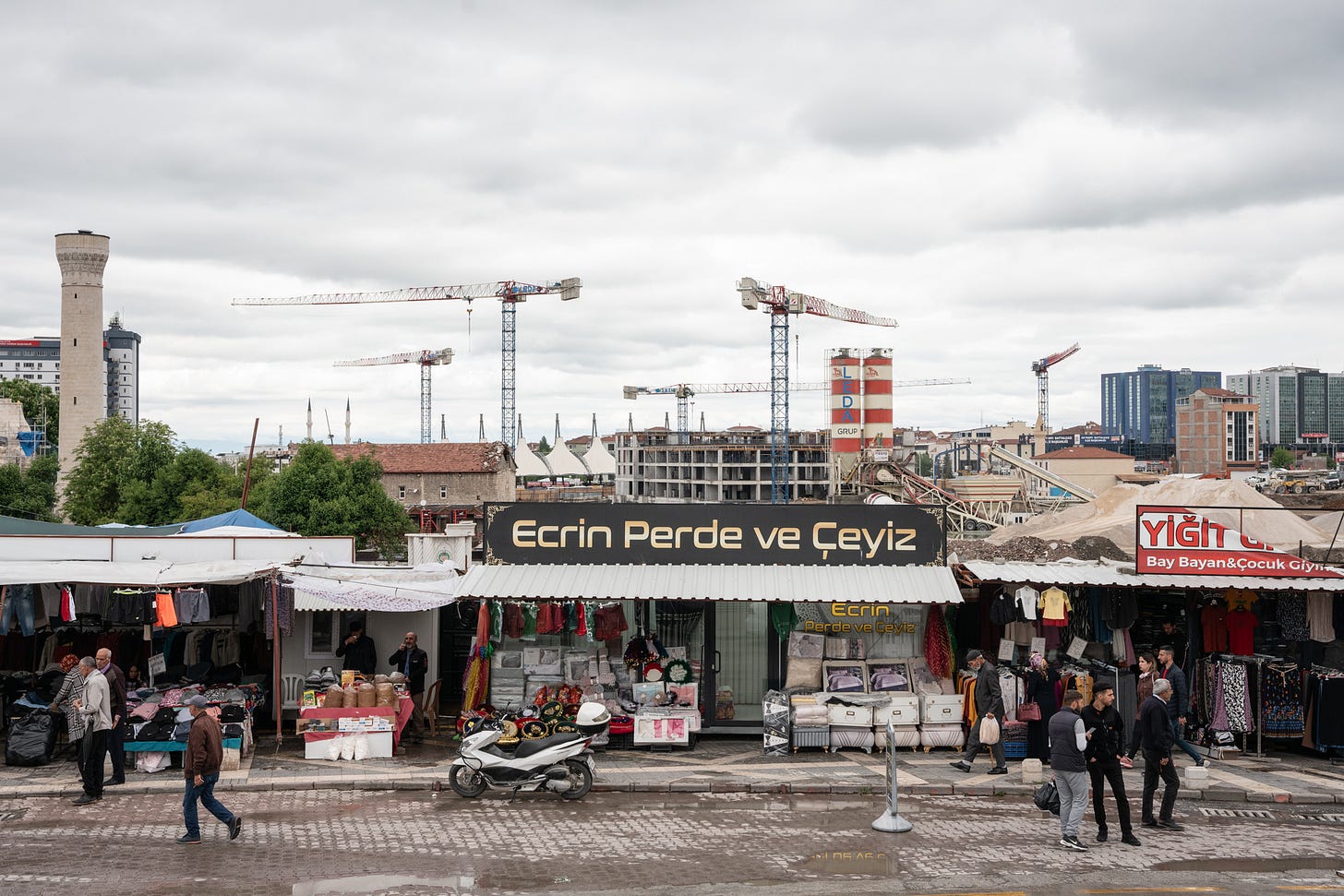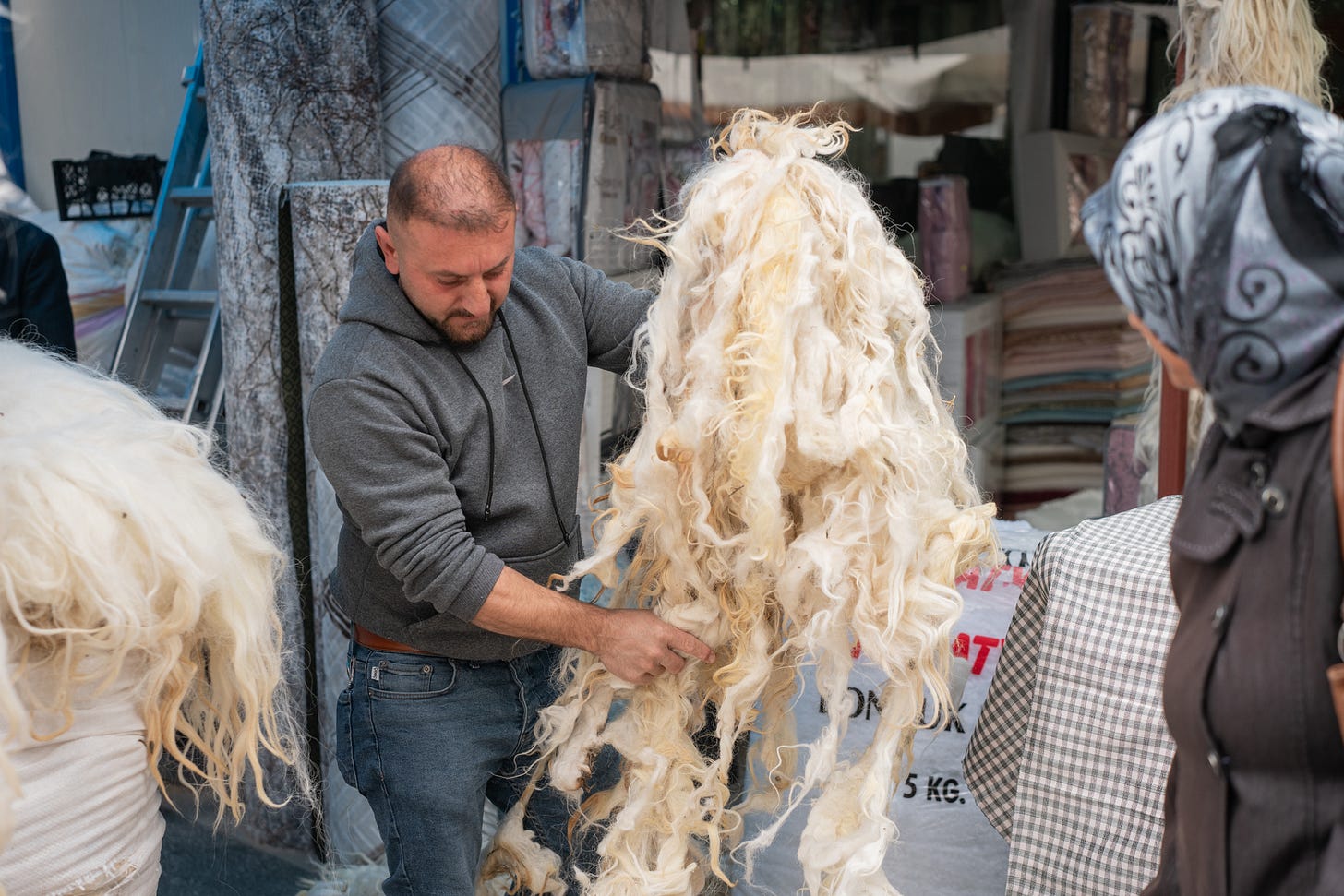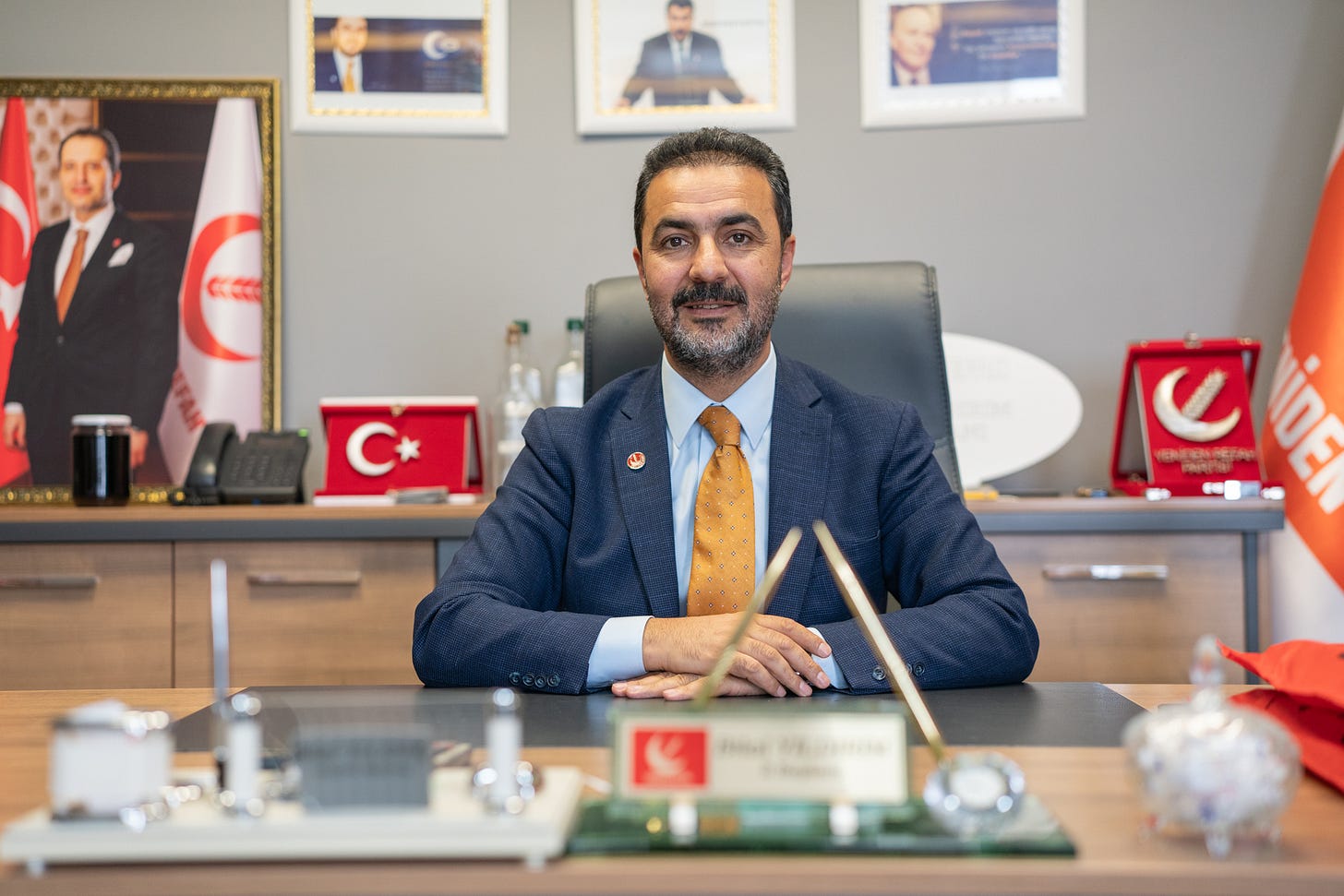Turkey recap recently visited three provinces in central Turkey to report on post-election developments in Anatolia. This is the last article in a series of three. Here are our reports from Şanlıurfa and Adıyaman.
MALATYA – “This was the place where Malatya’s heart was beating,” shopkeeper Serhat Çolak said.
He pointed towards an area once packed with small shops and narrow alleys. Now it is a massive construction site. A historic, damaged minaret is all that is left of the old bazaar. The Feb. 6, 2023 earthquakes destroyed the rest.
Cranes are currently building a new shopping center while the former shop owners sell their goods from containers across the street.
Çolak doesn’t know how long he’ll be able to sell his sheep wool here. He has permission to stay until the Sacrifice Feast in mid-June. After that, what will happen to shopkeepers and their shops is unclear.
The area where the containers stand is considered a reserve building area. This means that property owners must adopt the government’s rebuilding plan, the details of which have yet to be publicly disclosed.
Most probably, the temporary shops will soon move elsewhere.
“The uncertainty continues. That makes us angry,” said Çolak’s neighbor, a woman who didn’t want her name to be published.
More than 15 months after the earthquakes, a general lack of clarity defines recovery efforts in earthquake-hit cities. Combined with the broader economic troubles faced by almost all citizens, the parallel trends resulted in a major loss of support for the Justice and Development Party (AKP) in Malatya during the last local elections.
While the ruling AKP won the metropolitan municipality, it suffered an almost 20 percentage point decrease in the vote share compared to the 2019 local elections. Meanwhile, the main opposition Republican People's Party (CHP) increased its vote share by more than half, to 37 percent. The New Welfare Party (YRP) came in third place, with 9 percent of the votes in March.
The city has a long history of supporting the AKP and Pres. Recep Tayyip Erdoğan, but local politicians and citizens told Turkey recap they felt Malatya had not received sufficient earthquake recovery assistance, and that their unmet expectations were reflected in the local election results.
While some were hopeful about the city’s new mayor, others were skeptical, and experts believe that without significant improvements in local governance over the next five years, AKP losses in the region could deepen.
Forty acres and a mule
Bilal Yıldırım, YRP’s mayoral candidate in Malatya, saw anger after the promises of the general election were not fulfilled during his election campaign this spring.
"The [AKP] MPs told the people: give us your votes so we can get reelected again. Let's build your houses and workplaces," Yıldırım told Turkey recap.
During an interview about one month after the local elections, Yıldırım spoke while drinking tea with chia seeds. He owns a factory producing chicken meat for export and describes himself as an enthusiast of alternative medicine and medical aromatic plants.
His office is full of self-picked seeds, spices and pictures of politicians like Necmettin Erbakan (the founder of Turkey’s Milli Görüş movement), İsmet İnönü (the country’s second president, who was also from Malatya), Erdoğan, and many more. Yıldırım has been active in politics for years and shares the same ideological background as many AKP politicians.
“They got those votes. Afterwards, no houses were built, no workplaces were built,” he continued. “If you look at the AK Party, even if they took the mayorship, we can see they have suffered a big loss.”
In the second round of the May elections last year, Erdoğan received 72 percent of the votes in Malatya. His party gained 45 percent of the province’s votes and sent four MPs to the parliament, alongside one additional MP from their ally, the Nationalist Movement Party (MHP). CHP has one Malatya MP in parliament.
The AKP’s former mayor was elected with 68 percent of the votes five years ago. The current AKP mayor, Sami Er, received about 49 percent of the votes in March.
Moving backward
Political scientist Seren Selvin Korkmaz, who is from Malatya, told Turkey recap that based on her frequent visits to the city, people had begun signaling their discontent long before voting day, but many remained unsure about which party would bring about change: YRP or CHP?
Despite overwhelming support for the AKP in the past, Malatya had little to show for it, she argued.
“The city is moving backward, not forward in terms of development and economic problems,” Korkmaz said.
She added that in the May 2023 general election, Malatya residents believed Erdoğan was the only candidate who could get the city back on its feet. Today, many feel forgotten.
“People understand the government cannot solve [the problems of] their city,” Korkmaz said.
YRP’s Yıldırım believes the results could have been even worse for the AKP.
“In the last week [before elections], some people gravitated towards the AK Party even though they were angry at them,” the YRP candidate claimed, noting his party took a 15 percent vote share in the municipal councils. “They didn’t want a CHP victory in Malatya.”
Local residents interviewed by Turkey recap expressed their dislike for the CHP often in connection to their perceived collaboration with the pro-Kurdish DEM Party, which they equate to the outlawed Kurdistan Workers’ Party (PKK). This narrative is also used by AKP officials and pro-government media.
“People have already started to regret their votes,” Yıldırım added.
On the other hand, even though he considers some of the votes CHP collected in Malatya as “emanet votes”, a one-time support that might not be repeated, Yıldırım also noted the perception towards the main opposition party has changed.
“People see how Ankara has been governed under a CHP mayor,” Yıldırım said. “So, what happened there? Did anyone interfere with the travel freedom of the veiled women? Did they close the mosques?”
Part of the conservative base sees there is little to fear in the CHP, Yıldırım concluded.
Malatya mayor Sami Er was not available for an interview with Turkey recap.
Changing perceptions
Malatya, with a population of around 740,000, is mainly populated by Turks and Kurds. Most of the people living in the province are either Sunni or Alevi Muslims. It’s also home to small Armenian and Assyrian communities, but the city is slowly losing its population diversity and has become dominated by a conservative majority.
Roj Girasun, the director of Rawest Research, said CHP had long been seen as an “Alevi party” in the region, and that’s why Sunnis didn’t want to support them, but this perception changed with the latest elections.
“CHP broke some of the mental barriers against it,” Girasun told Turkey recap.
According to Girasun, the change in CHP started with the former leader Kemal Kılıçdaroğlu and accelerated with the current administration under party head Özgür Özel. Girasun sees this change resonating in local election successes.
“Nominating [Ekrem] İmamoğlu and [Mansur] Yavaş in 2019 was a part of that change,” he said. “Creating new actors without stereotypical CHP profiles was a step.”
Speaking at the opposition party’s headquarters in the city, provincial CHP chair Barış Yıldız credited his party’s local electoral success to the transformation as well as ongoing economic problems and accumulated reactions against corruption in state bodies.
Yıldız began his position just a few days before the earthquakes. His office walls are decorated with portraits of the country’s founding father Mustafa Kemal Atatürk, CHP head Özel and a drawing showing him next to Kılıçdaroğlu.
Yıldız said quick responses and aid relief provided by CHP municipalities after the earthquakes also improved the party’s local image.
“Some of those new votes came from those efforts,” Yıldız said. “When people saw the help coming from the CHP, they better understood CHP’s capabilities.”
But gaining the majority of the votes in the province remains a long-term project, he added.
“It may be one of the last places in Turkey that will be convinced of the change of power,” Yıldız said, adding that they were struggling to challenge long-held beliefs towards their party. “Changing that sociology is not something that will happen in one election.”
A new CHP in Malatya
Seren Selvin Korkmaz also highlighted the change in the political style of the CHP.
“Previously, the CHP was just visiting people who are close to the CHP. They were not in the streets to engage with youths,” she told Turkey recap. “But now, when you look at Veli Ağbaba’s campaign, he was among the youth in the streets and he tried to find solutions to their problems.”
Ağbaba has been serving as an MP for Malatya since 2011 and he was CHP’s mayoral candidate for the last local elections. He comes from one of the “known families” of Malatya and Ağbaba’s candidacy helped CHP’s vote share increase to 37 percent from 23 percent in 2019 despite local media reporting allegations of foul play involving local tenders.
Underlining the importance of local factors, Korkmaz pointed out that the previous mayor Selahattin Gürkan was a well-known politician and that some Alevi and CHP voters supported him.
On the other hand, his successor Sami Er comes from a technocratic background. Even though Er is from Malatya, his former roles under the AKP with TOKİ and the Fatih Municipality in İstanbul did not seem to persuade local voters.
Looking ahead, Korkmaz expects both the CHP and YRP to threaten AKP rule in the province. Even though the New Welfare candidate underperformed on the provincial level, the party can continue to divide conservative voters, according to Korkmaz.
“If they pursue a good agenda, and if they create a very active local branch in Malatya, they can continue to increase these threats. Especially, they can be attractive for people who believe they cannot work with CHP,” Korkmaz said.
“For CHP, if Veli Ağbaba continues in that way … always in the city and trying to interact with people. … We can see the surprising rise of the CHP in the city. But we should also closely follow what AKP will do in Malatya, and in macro politics,” she added.
Back in the container shops, even though they face pretty similar conditions, wool seller Çolak and his neighbor do not share similar sentiments towards the government and the new management of the city.
Both have backed AKP for a long time, however, while Çolak’s support and hopes for AKP continue, his neighbor’s votes this time were divided between CHP on the mayoral level and YRP in her district.
She was uncertain about going to the ballot box after her frustration with the government’s late and insufficient earthquake response.
“We had to do our duty as citizens,” she said.
“We still remember the screams of the people [the morning of the earthquake]. It is not easy to forget those,” one of the few women shopkeepers in the bazaar continued. “I don’t have high hopes [for the new mayor] without seeing some steps. I only want them to do things beneficial for us ... Let's say, it’ll be good, inşallah.”
This newsletter is supported by readers via Substack and Patreon. Paid subscribers get full access to our recaps, reports, members-only Slack and news tracking tools. All proceeds go towards sustaining our journalism.
Turkey recap is produced by the Kolektif Medya Derneği, an İstanbul-based non-profit association founded by our editorial team to support and elevate news media and journalists in Turkey. Contact us: info@turkeyrecap.com
Diego Cupolo, Editor-in-chief @diegocupolo
Gonca Tokyol, Editor-at-large @goncatokyol
Ingrid Woudwijk, Managing editor @deingrid
Verda Uyar, Digital growth manager @verdauyar
Emily Johnson, Deputy editor @emilyjohnson
Damla Uğantaş, Tr Türkçe editor @damlaugantas








